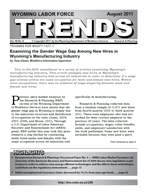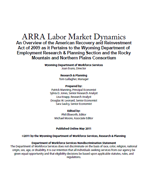
Occasional Paper No. 5
ARRA Labor Market Dynamics An Overview of the American Recovery and Reinvestment Act of 2009 as it Pertains to the Wyoming Department of Employment Research & Planning Section and the Rocky Mountain and Northern Plains Consortium

The full document is available online here.
- Chapter 1.
- Definition(s) of "Green" Jobs
- Chapter 2.
- A Review of Alternative Energy and Environmental Enhancement Technologies (Excerpted in June 2011 Trends)
- Chapter 3.
- State Level Legislation Regarding Energy-Efficient Technologies
- Chapter 4.
- Legislation and Regulatory Landscape Regarding EE Technologies
- Chapter 5.
- Results of the Baseline Survey (Article in February 2011 Trends)
- Chapter 6.
- A Summary of the New Hires Survey (Article in February 2011 Trends)
- Chapter 7.
- Text Mining Analysis of the New Hires Survey
- Chapter 8.
- Wyoming IMPLAN Analysis of ARRA Spending (Article in October 2010 Trends)
Text Mining Analysis of the New Hires Survey
Using the data from the New Hires Survey (2009Q4 and 2010Q1), a project was conducted to identify the job skills required for newly hired employees. Additionally, the difference in skill sets between those workers with an EE ("energy efficiency" or "environmentally enhancing") component to their jobs was compared to those workers that did not (see the definition of EE employment). The results of this research will be used to inform employees, educators, policy makers, and training providers about the skills necessary to gain employment in Wyoming's labor market.
Methodology
The new hires questionnaire was comprised of two types of questions: closed-ended questions and open-ended questions. Closed-ended questions limit the number of possible responses. These types of questions force respondents to choose from a limited number of responses. An example of a closed-ended question is "What time is it where you live?" In open-ended questions, response options are not limited. "What is your opinion of Wyoming's economy?" is an example of an open-ended question. To assess employer skills needs, R&P first asked employers closed-ended questions about five types of skills:
- Service orientation (actively looking for ways to help people);
- Critical thinking (using logic and reasoning to identify the strengths and weaknesses of alternative solutions, conclusions or approaches to problems);
- Reading comprehension (understanding written sentences and paragraphs in work-related documents);
- Technology design (generating or adapting equipment and technology to serve user needs); and
- Operation and control (controlling operations of equipment or systems).
The open-ended question was, "In your opinion, what one skill is most important to accomplishing the activities and duties of this job? It could be one of the above or it could be another skill."
In order to evaluate respondents' answers to the open-ended question, a technique called text mining was employed. Text mining is a useful tool for evaluating and quantifying responses to open-ended questions. The process helps to identify themes that cannot otherwise be determined from closed-ended questions. The purpose of identifying themes is to capture information based on what respondents consider important, not what researchers consider important. For large surveys (over 5,000 responses in this case), text mining by hand is impractical. Therefore, R&P used text mining software to expedite the process of capturing common themes reported by employers about skills needed to be successful in jobs for which employees were newly hired.
Results
Of the 5,331 newly hired positions examined, service orientation was the skill most frequently reported as being important (28.1%). Understandably, more than one skill was considered as important for many of these newly hired jobs. The 10 most frequent co-occurrences are shown in the Table 1.
Of all new hires, 926 (17.4%) held jobs that involve activities and duties related to increasing energy efficiency, utilizing or developing renewable energy resources, or preserving and/or restoring the environment some or all of the time.
Of the five skills, critical thinking had the highest frequency of importance for environmental jobs: (247 of 926, or 26.7%) followed by service orientation (185, or 20.0%). Although critical thinking was more often reported as important for environmental jobs (26.7%) than for non-environmental jobs (16.8%), it was important for all jobs. The full text mining report is available online here.

